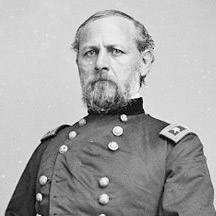 |
| Maj. Gen. Don Carlos Buell |
By the spring of that same year, as the Confederate Army under Gen. Albert Sidney Johnston was retreating to Corinth, Mississippi, Buell was in pursuit. Arriving at Pittsburg Landing on April 7, the second day of the bloody Battle of Shiloh, Buell played a key role that ensured a Union victory, but one that embarrassed the commanding general, U.S. Grant, sparking one of many after-battle controversies.
After Shiloh, Buell served under General Henry W. Halleck in the Union advance on Corinth, after which he was sent to capture Chattanooga, to hold that city and head off a Confederate invasion into Kentucky. That invasion, led by Confederate Gen. Braxton Bragg, began this date 150 years ago today.
 |
| Gen. Braxton Bragg |
Also by this date, Gen. Bragg had reorganized his 30,000-man Army of Mississippi into 2 wings. The Right Wing is commanded by Maj. Gen. Leonidas Polk, and consists of Cheatham’s and Wither’s infantry divisions and Lay’s Cavalry Brigade. The Left Wing is commanded by Maj. Gen. William J. Hardee, and is made up of Simon Buckner’s and Patton Anderson’s infantry divisions, and Wheeler’s Cavalry Brigade. Wood's Brigade, including the 32 Mississippi Infantry Regiment, is placed in Buckner’s Division. They will begin their invasion today by crossing the Tennessee River. Soon, the Confederates will be marching through Kentucky before Buell or Washington D.C have any idea where they are or what they are up to.
 |
| Gen. Edmund Kirby Smith |
Bragg’s invasion of Kentucky will be practically simultaneous with Robert E. Lee’s invasion of Maryland. These 2 movements will cause ominous foreboding and dismay in the North. The war will come very close to the Northern people when Confederate detachments soon appear near Covington, in sight of Cincinnati, and also across the Potomac River into the Maryland.
But on Thursday, August 28, barely 17 years old, my great grandfather, Pvt. Nathan Oakes of the 32nd Mississippi Infantry Regiment along with Great Uncle William Turner, crossed into Tennessee with the Confederate invasion force. They will soon see fighting in Kentucky. The excited soldiers march from Chattanooga singing hymns and, of course, "Dixie." In time, though, their songs will be muted by the arduous trek up from the Tennessee Valley, through the mountains on the eastern edge of the Cumberland Plateau.
 |
| Bragg's Kentucky Campaign, 1862 Source: Civil War Trust |
At the peak of the campaign, the Confederate army will battle the Federal army as far north as Perryville in October. Although Buell will check the Confederate advance, unfortunately for him he does not pursue the retreating Confederates quickly enough following that battle on October 8. As a consequence shortly thereafter, Buell will be relieved of his command and replaced by Gen. William Rosecrans.
Sources: Army of the Heartland: The Army of Tennessee, 1861-1862, Thomas Lawrence Connelly; An American Iliad: The Story of the Civil War, Charles P. Roland; Stone's River: The Turning-Point of the Civil War, Wilson J. Vance
No comments:
Post a Comment